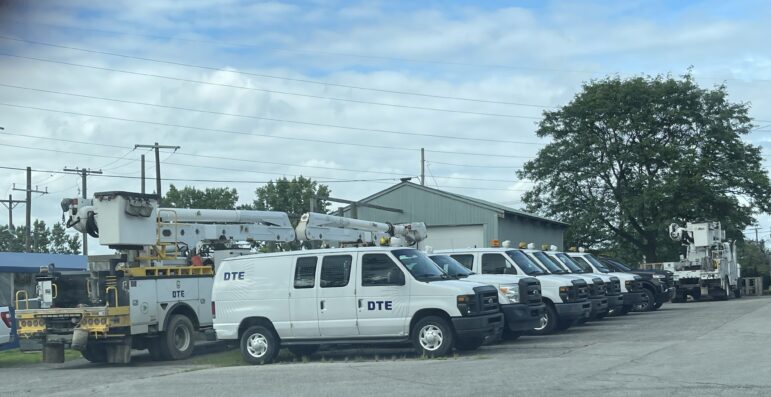For West Bloomfield resident Khalid Turaani, every time a big storm comes to town, he is usually one of the thousands of Michiganders who lose power.
Turaani has had to improvise on numerous occasions during these outages, having to borrow a generator from a friend in order for his two freezers of food not to go bad. Turaani even said that there was a time where his family was relying on the fireplace for heat for two or three days back when over 1.3 million Michigan residents lost power in February.
Turaani said he understands that there are circumstances in which nobody but Mother Nature is to blame for these outages but said his biggest issue when the power goes out is the lack of accurate time estimations from power companies like DTE Energy and Consumers Energy.
“I know those guys are working as hard as they can, or I assume that they are,” said Turaani. “But they just don’t give you any kind of estimation of any kind, which is probably more frustrating than losing the power.”
There have been 1.3 million more power outages between the months of February and June this year compared to 2022 according to the Michigan Public Service Commision.
According to a blog published by DTE, two-thirds of DTE’s power lines are above ground and susceptible to damage from different weather conditions, leaving many wondering why not build underground lines?
fifty-seven out of the 62 cities, villages and townships that make up Oakland County are provided electricity solely by DTE, which causes many to look at them for answers when the power goes out.
Preventing The Next One
DTE’s senior communications strategist Dave Akerly declined to answer specific questions but wrote in an email that said the public can find answers to questions about power outages on DTE’s blog.
The blog states that the company believes that even though in-ground wires may solve the issue weather presents, they would still happen to bring up a whole new set of problems. DTE’s website notes that in-ground wires are vulnerable to damage by things like animals, or construction and landscape work.

DTE’s blog also said moving all the company’s above-ground lines underground would have an estimated cost of up to $30 billion.
Although moving the power lines underground may not be a realistic option at this point, DTE is still trying to make their service more reliable for customers. It has invested $5 billion to upgrade its power grid in the last five years, according to DTE’s blog. The company also plans to do things like trim trees and make upgrades to the existing infrastructure.
The MPSC has also instituted a rule that requires power companies to offer outage credits to customers dealing with frequent outages.
The head of the MPSC’s media relations department, Matt Helms, said that one of the commission’s biggest roles is to make sure power is something residents of Michigan, which is one of the reasons they began using outage credits.
“Ensuring reliability is one of the chief functions of the MPSC because that is one of our priorities as an energy regulator,” said Helms.
West Bloomfield Township Supervisor Steve Kaplan said that the township has been pushing DTE and Consumers Energy to find alternative solutions for West Bloomfield residents.
“We’ve encouraged them to engage in tree cutting, not tree removal, but maybe branches that are entangled or near wires,” said Kaplan. “We’ve found them to be really responsive, and they’ve actually implemented a program where they’ve begun cutting trees in West Bloomfield and other communities.”
Surging Storms
Kathy Peck has lived in West Bloomfield for almost 30 years, and unlike Turaani, Peck said losing power isn’t something that her and her family have to deal with too often.
“Maybe once a year, sometimes it flickers though,” said Peck when talking about how often she loses power.
That being said, Peck still understands the issues that power outages can present.
When Peck’s 26-year-old daughter Jessica was a newborn baby, Peck stocked up a couple of freezers with breast milk to feed her daughter for when she would have to return to work. Unfortunately for Peck, the power soon went out causing all of the milk to be in jeopardy of going bad.
“I was frantically calling DTE, and running around getting ice, trying to figure out what to do,” said Peck. “I just kept calling DTE and begging them, and eventually they got it back on within 18-24 hours.”
Eric Brouwer resides in nearby Wixom, and like Turaani, has dealt with a few power outages in the last year. Brouwer understands that power outages are largely out of these companies’ hands but said he believes they could still do a better job communicating with their customers about when to expect power back.
“They’re actually terrible at providing you updates on it, so that’s kind of the trade off,” said Brouwer. “I think their service (DTE) is generally pretty good but when there is an issue it seems like it’s all hands on deck to resolve the issue, so there’s nobody there to communicate what’s going on, or when to expect service to be restored.”
Brouwer said that the last power outage he experienced caused him to go out and buy his own generator.
“That was enough for us to go out and buy a generator, so we could at least power our refrigerator,” said Brouwer. “It’s a disappointing thing when your refrigerator dies for two days and you end up having to throw out a whole fridge full of food.”